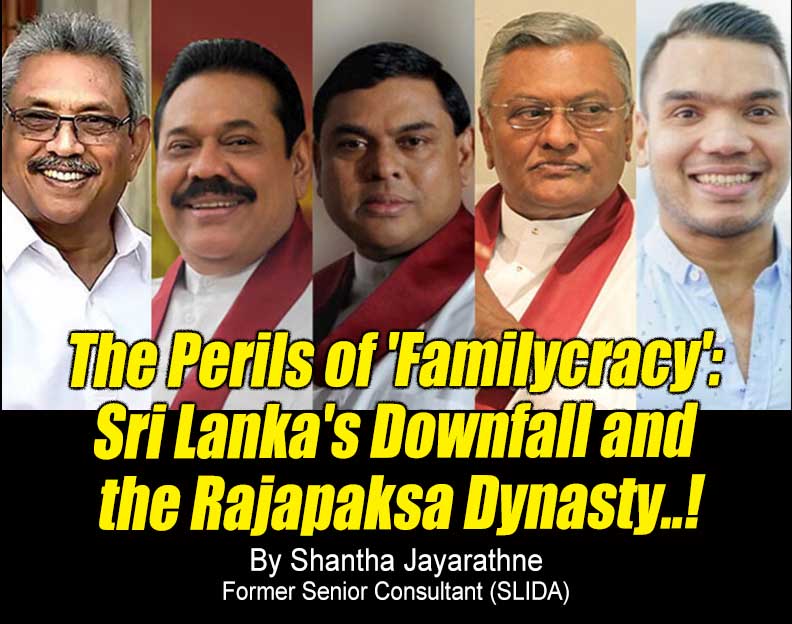-By Shantha Jayarathne -Former Senior Consultant (SLIDA)

(Lanka-e-News - 10.July.2023, 6.10 PM) Sri Lanka, once hailed as the "Pearl of the Indian Ocean," now stands as a failed state in South Asia. The reasons for this downfall have been debated by commentators, with some attributing it to external forces like debt and geopolitics, while others point to internal factors such as government mismanagement and inefficiency. However, a crucial factor underlying this catastrophe is the prevalence of "familycracy" within Sri Lanka's governance system, particularly exemplified by the Rajapaksa dynasty.
The most recent family to hold power in Sri Lanka were the Rajapaksas, whose regime spanned nearly fifteen years from 2005 to 2022, with a brief interruption from 2015 to 2019. Mahinda Rajapaksa came to power in 2005 by projecting himself as an ordinary man from a rural background. His popularity surged when he eliminated the Liberation Tigers of Tamil Eelam (LTTE), ending the Sri Lankan Civil War in 2009. However, this victory came at a great cost to the Sri Lankan economy and sacrificing thousands of lives both in the north and in the south which resulted in international isolation due to alleged war crimes and human rights violations.
The end of the war drained the Sri Lankan economy, as Western investors withdrew their commitments to industries such as apparel and tech due to concerns over human rights. In search of investment alternatives, the Rajapaksa regime turned to China, relying on Chinese loans for quick development projects instead of investing in human capital. However, these excessive loans resulted in economic harm, ultimately benefiting the Rajapaksa family.
To maintain power, the Rajapaksa government prioritized the support of the armed forces, allocating a disproportionate share of government spending to the military. This militarization of the state and disproportionate allocation of resources became a hallmark of their rule. Despite temporarily losing power in 2015, the Rajapaksa family made a successful comeback in 2019 by capitalizing on a tragic bombing incident, portraying themselves as strong leaders capable of maintaining law and order. Once back in power, they appointed numerous family members to crucial government positions without considering their qualifications.
The Rajapaksa family's pursuit of wealth and power turned Sri Lanka into a virtual family enterprise. Instead of prioritizing investment in human capital and heavy industries, they focused on short-term, visible infrastructure projects that primarily benefitted their hometown, supporters, and family business. These projects, funded by excessive loans, became emblematic of Sri Lanka's financial bankruptcy. Nepotism within the government further bred inefficiency, leading to poor decision-making and crises such as the fertilizer shortage that caused a food scarcity this year.
The plight of Sri Lanka and the dominance of the Rajapaksa family within its governance system underscore the urgent need for reflection and reform. Sri Lanka must prioritize the welfare of its people over the monopolization of power by a single family. Promoting meritocracy, investing in human capital, and fostering inclusive governance are essential steps toward sustainable development and prosperity. Sri Lanka's crisis should serve as a critical lesson, urging the nation to break free from the grip of family dynasties and work towards building a more inclusive and accountable political system. Only through collective efforts can Sri Lanka overcome the perils of "familycracy" and pave the way for a brighter future based on fairness, transparency, and the well-being of all its citizens.
Former Senior Consultant
Sri Lanka Institute of Development Administration
---------------------------
by (2023-07-10 13:00:22)
Leave a Reply